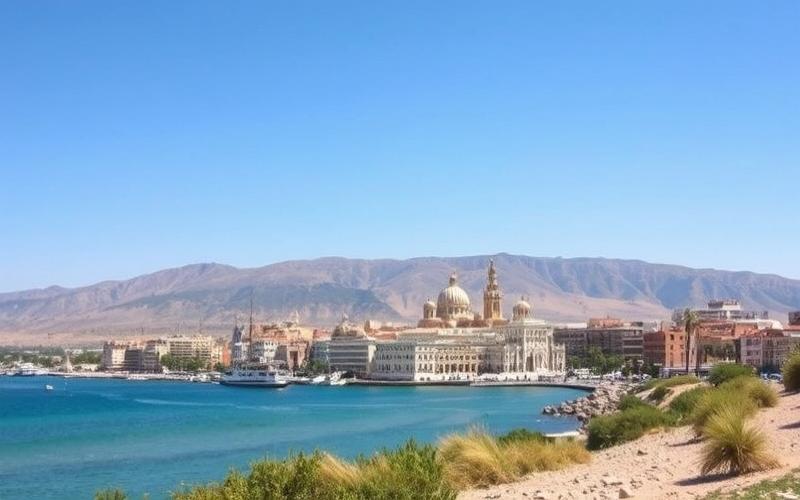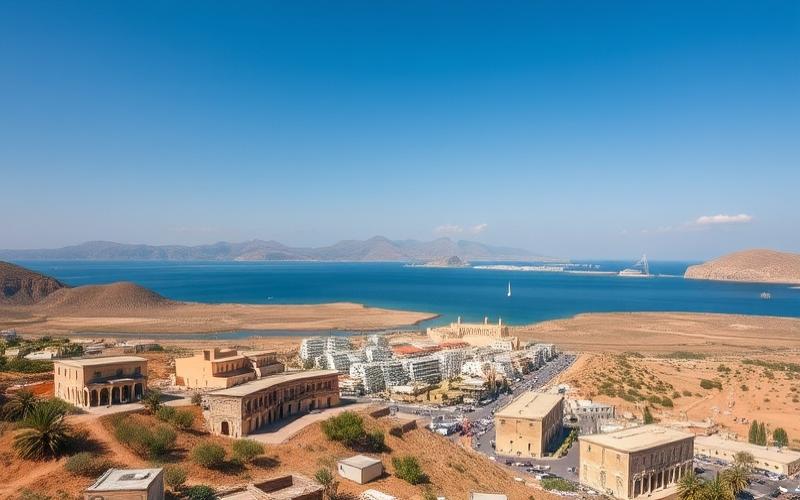
 Published on and written by Cyril Jarnias
Published on and written by Cyril Jarnias
Considering relocating to Cyprus? This Mediterranean island, rich in history and traditions, offers an attractive living environment for many expatriates. However, as with any relocation abroad, it’s crucial to prepare for the cultural differences that await you. Understanding Cypriot social norms, traditions, and customs will not only help you avoid faux pas but also integrate more easily into your new life. Let’s explore together the subtleties of Cypriot culture to ensure a successful relocation.
The Cypriot Social Code: Between Tradition and Modernity
Cypriot society is a fascinating blend of ancient traditions and modern influences. To navigate this unique social landscape with ease, it’s essential to understand the nuances of daily interactions and behavioral expectations.
Family at the Heart of Society
In Cyprus, family holds a central place in social and cultural life. Family ties are extremely strong and extend well beyond the nuclear family. It’s not uncommon to see multiple generations living under the same roof or in close proximity. This emphasis on family is reflected in many aspects of daily life:
- Sunday family meals are a sacred institution
- Important decisions are often made in consultation with the extended family
- Elderly people are highly respected and their opinions are frequently sought
As an expatriate, you’ll quickly notice that your Cypriot colleagues and friends often talk about their families and place great importance on family events. It’s considered good form to show interest in their family and to share information about your own as well.
Respect and Politeness: Cardinal Values
Cypriot society places great importance on respect and politeness in social interactions. These values manifest in various ways:
- Greetings are essential and should be warm
- Formal address is used with older people or in professional contexts
- Professional titles are frequently used (for example, “Doctor” for a physician)
It’s important to note that Cypriots tend to be more formal in their initial interactions than in some Western countries. Over time and as the relationship develops, this formality may decrease, but it’s always better to wait for your Cypriot counterpart to take the initiative for a more relaxed approach.
Cypriot Hospitality: A Millennial Tradition
Hospitality is a deeply rooted value in Cypriot culture. The island’s inhabitants are renowned for their warm welcome and generosity toward visitors and newcomers. As an expatriate, you’ll likely be invited to share meals or coffee with neighbors, colleagues, or new acquaintances. It’s considered impolite to refuse these invitations without a valid reason.
During these encounters, expect to be treated with great consideration:
- You’ll probably be offered abundant food and drinks
- It’s common for hosts to insist that you eat more
- Outright refusal may be perceived as impolite
To reciprocate this hospitality, it’s considered good form to bring a small gift when invited to someone’s home, such as flowers, pastries, or a bottle of wine.
Good to Know:
Cypriot society is built on strong family values, mutual respect, and generous hospitality. As an expatriate, adopting a respectful attitude, showing genuine interest in the local culture, and participating in welcoming traditions will open many doors for you.
Traditions and Customs: Dive into the Cypriot Soul
The cultural richness of Cyprus manifests through a multitude of traditions and customs that rhythm life on the island. Understanding and participating in these practices will not only help you integrate more easily but also allow you to fully appreciate the depth of Cypriot culture.
Religious Holidays: A Calendar Rich in Celebrations
The Orthodox religion plays a predominant role in Cypriot society, influencing many traditions and celebrations. Among the most important holidays are:
- Easter: the biggest holiday of the year, celebrated with fervor
- Christmas: a time for family celebrations
- Epiphany: marked by the blessing of the waters
Even if you’re not of Orthodox faith, it’s important to respect these traditions and understand their importance to the local population. Participating in public celebrations is often appreciated and can be an excellent opportunity to integrate.
Cypriot Cuisine: A Feast for the Senses
Cypriot cuisine is a central element of the island’s culture, reflecting its rich history and Mediterranean influences. Meals are often occasions for social and family gatherings. A few points to remember:
- Meze: an assortment of small dishes served as a complete meal
- Souvlaki and halloumi: staples of local cuisine
- Cypriot coffee: a tradition in itself, often accompanied by lively discussions
As an expatriate, participating in these culinary traditions is an excellent way to immerse yourself in the local culture. Don’t hesitate to try the specialties and share your impressions with your Cypriot hosts, who will be delighted to introduce you to their culinary heritage.
Festivals and Cultural Events: Living to the Rhythm of the Island
Cyprus is animated throughout the year by numerous festivals and cultural events celebrating its history, arts, and traditions. Among the most notable:
- The Kypria International Festival: a major event dedicated to performing arts
- The Limassol Carnival: colorful celebrations before Lent
- The Limassol Wine Festival: an opportunity to discover local wines
Participating in these events will not only allow you to have fun but also to immerse yourself in the local culture and meet Cypriots in a festive and relaxed context.
Wedding Traditions: A Spectacle Full of Color
Cypriot weddings are grand events reflecting the importance given to family and traditions. If you’re invited to a Cypriot wedding, expect:
- Celebrations that can last several days
- Traditional dances like “syrtos” and “zeimbekiko”
- Throwing rice and sugared almonds at the newlyweds for good luck
Attending a Cypriot wedding is a unique experience that will immerse you in the heart of local traditions. Don’t hesitate to participate in the dances and festivities—your enthusiasm will be appreciated.
Good to Know:
Cypriot culture is rich in traditions and celebrations. As an expatriate, actively participating in these events, whether religious holidays, cultural festivals, or culinary traditions, will allow you to build deeper connections with the local community and enrich your relocation experience.
Adapting to a new culture takes time and patience. To facilitate your integration and avoid cultural misunderstandings, here are some practical tips that will help you navigate Cypriot society with ease.
Communication: Between Mediterranean Warmth and Reserve
Cypriots are generally warm and expressive in their communication, but there are certain nuances to understand:
- Direct eye contact is appreciated and considered a sign of honesty
- Gestures are common in conversation, but avoid overly expansive gestures
- The tone of voice may seem higher than elsewhere, especially in animated discussions
It’s important to note that despite this apparent openness, Cypriots can be reserved about certain personal or sensitive political topics. Avoid bringing up controversial subjects like the island’s division or tensions with Turkey, unless your Cypriot counterpart mentions them first.
Dress Code: Between Casual and Formal
Dress style in Cyprus varies by context:
- In daily life, style is generally casual
- For work, a more formal dress code is often expected
- In places of worship, modest attire is required
As an expatriate, it’s best to observe and adapt to the local style. When in doubt, opt for slightly more formal attire than you would wear in your home country, especially in professional contexts or during important events.
Punctuality: A Flexible Concept
The concept of time in Cyprus may differ from what you’re used to:
- In social contexts, arriving 15-30 minutes late is often acceptable
- For professional appointments, punctuality is more important
- Public transport and service schedules may be less strict than elsewhere
Adapt to this more relaxed rhythm in social life, but remain punctual in your professional commitments to avoid any misunderstandings.
Taboos and Sensitive Topics: Navigating with Diplomacy
Some topics may be delicate to discuss in Cyprus:
- The island’s division between north and south
- Relations with Turkey
- Religious differences
If these topics are brought up, listen carefully and avoid making judgments. It’s better to let your Cypriot interlocutors guide the conversation on these sensitive themes.
Respect for Religious Traditions
Even if you don’t share the local beliefs, it’s important to respect religious traditions:
- Dress modestly when visiting churches
- Respect fasting periods, especially during Lent
- Avoid loud or disrespectful behavior near places of worship
Showing respect for these traditions will help you gain the esteem of your Cypriot hosts and facilitate your integration.
Good to Know:
The key to avoiding cultural faux pas in Cyprus lies in observation, respect, and adaptation. By being attentive to the nuances of local communication, respecting dress codes and religious traditions, and tactfully approaching sensitive topics, you’ll demonstrate your open-mindedness and respect for Cypriot culture.
The Cypriot Way of Life: Embrace the Mediterranean Rhythm
Relocating to Cyprus also means adopting a new rhythm of life, imbued with Mediterranean gentleness. Understanding and embracing this way of life will not only help you integrate more easily but also allow you to fully enjoy your experience on the island.
Coffee, the Social Ritual Par Excellence
Coffee occupies a central place in Cypriot social life. More than just a beverage, it’s a true ritual that sets the rhythm of the days:
- Cypriot coffee, similar to Turkish coffee, is served in small cups
- Coffee breaks are frequent and can last a long time
- It’s an opportunity to chat, socialize, and even conduct business
Participating in these coffee moments is an excellent way to build connections and integrate into the local community. Don’t hesitate to invite your colleagues or neighbors for coffee—it’s a common and appreciated practice.
The Siesta, a Tradition to Respect
The siesta is a well-established tradition in Cyprus, especially during the summer months when the heat can be intense:
- Many shops close between 1 PM and 4 PM
- Streets are often quiet during these hours
- Life resumes in the late afternoon and extends into the evening
Respect this rhythm, especially at the beginning of your stay. Plan your activities accordingly and take advantage of this break time to rest or adapt to the local climate.
Outdoor Living: Enjoy the Mediterranean Climate
Cyprus’s favorable climate encourages an outdoor-oriented lifestyle:
- Cafe and restaurant terraces are lively year-round
- Parks and beaches are popular meeting places
- Outdoor activities (hiking, water sports) are highly valued
Adopt this outdoor lifestyle to fully enjoy your relocation. It’s also an excellent way to meet locals and other expatriates in a relaxed setting.
The Conviviality of Tavernas
Cypriot tavernas are much more than simple restaurants. They’re places of conviviality where gastronomy, music, and dance mingle:
- Meals are often long and animated
- Sharing dishes among guests is common
- Music and dance are often an integral part of the experience
Frequenting local tavernas will allow you to immerse yourself in the authentic Cypriot atmosphere and build connections with the community.
The Concept of “Siga Siga” (Slowly, Slowly)
The expression “siga siga” well summarizes the Cypriot approach to life:
- It encourages taking your time and not rushing
- It reflects a more relaxed attitude toward stress and challenges
- It invites savoring the present moments
Adopting this philosophy will help you adapt to the local rhythm of life and reduce relocation-related stress. Learn to appreciate the small daily pleasures and not to get upset about minor setbacks.
Good to Know:
The Cypriot way of life is characterized by a slower pace of life, importance placed on social relationships, and appreciation of life’s simple pleasures. By adopting these habits, like extended coffee breaks, respecting the siesta, outdoor living, and frequenting local tavernas, you’ll integrate more easily and fully enjoy your relocation experience in Cyprus.
Conclusion: Your New Life in Cyprus
Relocating to Cyprus offers a unique opportunity to immerse yourself in a rich culture where ancient traditions and modernity coexist harmoniously. By understanding and respecting Cypriot social norms, traditions, and customs, you’ll lay the foundation for successful integration.
Remember that adaptation takes time. Be patient with yourself and open to new experiences. The warmth and hospitality of Cypriots will greatly facilitate your transition. Don’t hesitate to actively participate in local life, whether by frequenting tavernas, participating in festivals, or simply taking time to chat over coffee.
Your relocation to Cyprus will be what you make of it. Embrace the Mediterranean rhythm of life, savor the island’s culinary richness, and let yourself be seduced by the beauty of its landscapes. With time, you’ll discover that Cyprus is not just a destination, but a true way of life.
Disclaimer: The information provided on this website is for informational purposes only and does not constitute financial, legal, or professional advice. We encourage you to consult qualified experts before making any investment, real estate, or expatriation decisions. Although we strive to maintain up-to-date and accurate information, we do not guarantee the completeness, accuracy, or timeliness of the proposed content. As investment and expatriation involve risks, we disclaim any liability for potential losses or damages arising from the use of this site. Your use of this site confirms your acceptance of these terms and your understanding of the associated risks.



























